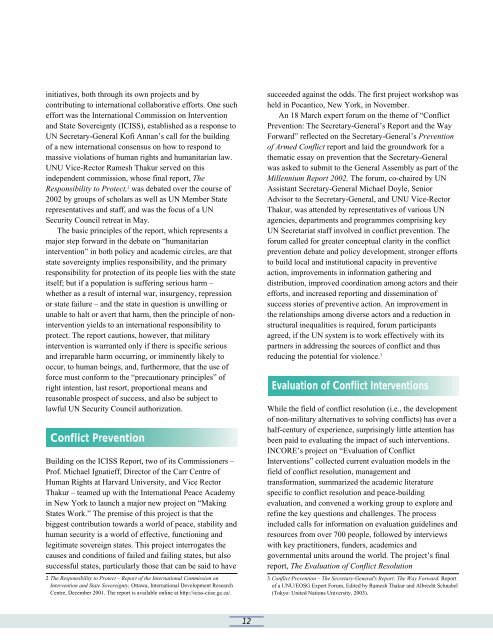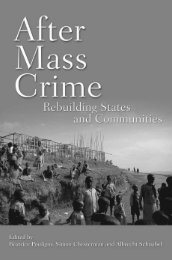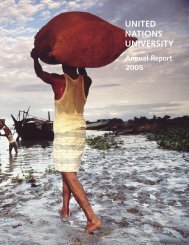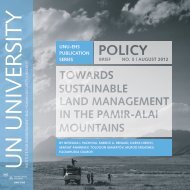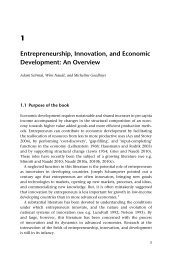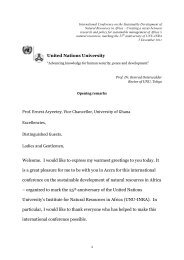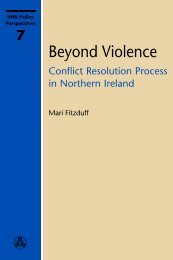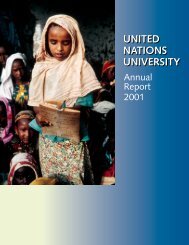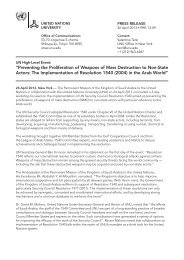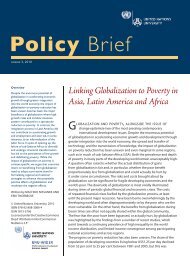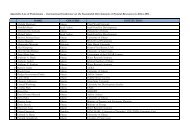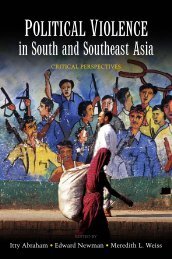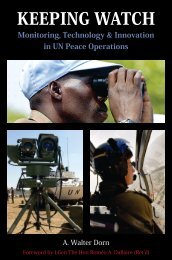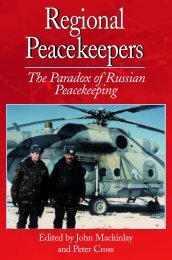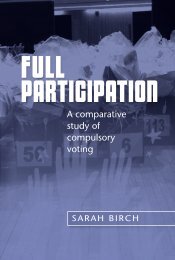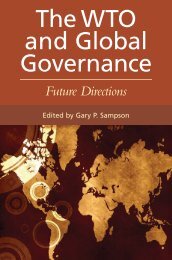Environment and Sustainable Development - United Nations ...
Environment and Sustainable Development - United Nations ...
Environment and Sustainable Development - United Nations ...
Create successful ePaper yourself
Turn your PDF publications into a flip-book with our unique Google optimized e-Paper software.
initiatives, both through its own projects <strong>and</strong> by<br />
contributing to international collaborative efforts. One such<br />
effort was the International Commission on Intervention<br />
<strong>and</strong> State Sovereignty (ICISS), established as a response to<br />
UN Secretary-General Kofi Annan’s call for the building<br />
of a new international consensus on how to respond to<br />
massive violations of human rights <strong>and</strong> humanitarian law.<br />
UNU Vice-Rector Ramesh Thakur served on this<br />
independent commission, whose final report, The<br />
Responsibility to Protect, 2 was debated over the course of<br />
2002 by groups of scholars as well as UN Member State<br />
representatives <strong>and</strong> staff, <strong>and</strong> was the focus of a UN<br />
Security Council retreat in May.<br />
The basic principles of the report, which represents a<br />
major step forward in the debate on “humanitarian<br />
intervention” in both policy <strong>and</strong> academic circles, are that<br />
state sovereignty implies responsibility, <strong>and</strong> the primary<br />
responsibility for protection of its people lies with the state<br />
itself; but if a population is suffering serious harm –<br />
whether as a result of internal war, insurgency, repression<br />
or state failure – <strong>and</strong> the state in question is unwilling or<br />
unable to halt or avert that harm, then the principle of nonintervention<br />
yields to an international responsibility to<br />
protect. The report cautions, however, that military<br />
intervention is warranted only if there is specific serious<br />
<strong>and</strong> irreparable harm occurring, or imminently likely to<br />
occur, to human beings, <strong>and</strong>, furthermore, that the use of<br />
force must conform to the “precautionary principles” of<br />
right intention, last resort, proportional means <strong>and</strong><br />
reasonable prospect of success, <strong>and</strong> also be subject to<br />
lawful UN Security Council authorization.<br />
Conflict Prevention<br />
Building on the ICISS Report, two of its Commissioners –<br />
Prof. Michael Ignatieff, Director of the Carr Centre of<br />
Human Rights at Harvard University, <strong>and</strong> Vice Rector<br />
Thakur – teamed up with the International Peace Academy<br />
in New York to launch a major new project on “Making<br />
States Work.” The premise of this project is that the<br />
biggest contribution towards a world of peace, stability <strong>and</strong><br />
human security is a world of effective, functioning <strong>and</strong><br />
legitimate sovereign states. This project interrogates the<br />
causes <strong>and</strong> conditions of failed <strong>and</strong> failing states, but also<br />
successful states, particularly those that can be said to have<br />
2 The Responsibility to Protect – Report of the International Commission on<br />
Intervention <strong>and</strong> State Sovereignty, Ottawa, International <strong>Development</strong> Research<br />
Centre, December 2001. The report is available online at http://iciss-ciise.gc.ca/.<br />
succeeded against the odds. The first project workshop was<br />
held in Pocantico, New York, in November.<br />
An 18 March expert forum on the theme of “Conflict<br />
Prevention: The Secretary-General’s Report <strong>and</strong> the Way<br />
Forward” reflected on the Secretary-General’s Prevention<br />
of Armed Conflict report <strong>and</strong> laid the groundwork for a<br />
thematic essay on prevention that the Secretary-General<br />
was asked to submit to the General Assembly as part of the<br />
Millennium Report 2002. The forum, co-chaired by UN<br />
Assistant Secretary-General Michael Doyle, Senior<br />
Advisor to the Secretary-General, <strong>and</strong> UNU Vice-Rector<br />
Thakur, was attended by representatives of various UN<br />
agencies, departments <strong>and</strong> programmes comprising key<br />
UN Secretariat staff involved in conflict prevention. The<br />
forum called for greater conceptual clarity in the conflict<br />
prevention debate <strong>and</strong> policy development, stronger efforts<br />
to build local <strong>and</strong> institutional capacity in preventive<br />
action, improvements in information gathering <strong>and</strong><br />
distribution, improved coordination among actors <strong>and</strong> their<br />
efforts, <strong>and</strong> increased reporting <strong>and</strong> dissemination of<br />
success stories of preventive action. An improvement in<br />
the relationships among diverse actors <strong>and</strong> a reduction in<br />
structural inequalities is required, forum participants<br />
agreed, if the UN system is to work effectively with its<br />
partners in addressing the sources of conflict <strong>and</strong> thus<br />
reducing the potential for violence. 3<br />
Evaluation of Conflict Interventions<br />
While the field of conflict resolution (i.e., the development<br />
of non-military alternatives to solving conflicts) has over a<br />
half-century of experience, surprisingly little attention has<br />
been paid to evaluating the impact of such interventions.<br />
INCORE’s project on “Evaluation of Conflict<br />
Interventions” collected current evaluation models in the<br />
field of conflict resolution, management <strong>and</strong><br />
transformation, summarized the academic literature<br />
specific to conflict resolution <strong>and</strong> peace-building<br />
evaluation, <strong>and</strong> convened a working group to explore <strong>and</strong><br />
refine the key questions <strong>and</strong> challenges. The process<br />
included calls for information on evaluation guidelines <strong>and</strong><br />
resources from over 700 people, followed by interviews<br />
with key practitioners, funders, academics <strong>and</strong><br />
governmental units around the world. The project’s final<br />
report, The Evaluation of Conflict Resolution<br />
3 Conflict Prevention – The Secretary-General's Report: The Way Forward. Report<br />
of a UNU/EOSG Expert Forum, Edited by Ramesh Thakur <strong>and</strong> Albrecht Schnabel<br />
(Tokyo: <strong>United</strong> <strong>Nations</strong> University, 2003).<br />
12


